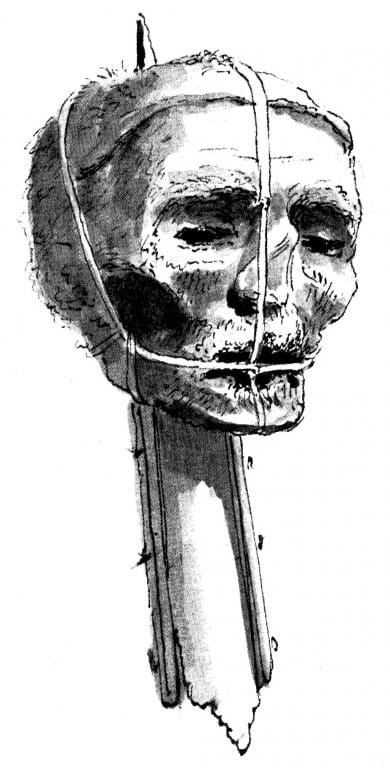 Donald Trump has been impeached a second time, even though he has already left office. The House charged him with “Insurrection” for his role in allegedly inciting his supporters to attack the Capitol on January 6 in an effort to prevent Congress from certifying Joe Biden’s election. The Senate trial will begin on February 8.
Donald Trump has been impeached a second time, even though he has already left office. The House charged him with “Insurrection” for his role in allegedly inciting his supporters to attack the Capitol on January 6 in an effort to prevent Congress from certifying Joe Biden’s election. The Senate trial will begin on February 8.
But is it possible to impeach someone who no longer holds office? Some experts say, yes, pointing to a couple of precedents of office holders who were impeached after they were expelled or resigned. But other experts say that impeaching a private citizen is impossible, pointing out that those who were impeached after leaving office were not convicted, in part because the senators doubted that the proceedings were legal. (Read this for the legal case against impeaching a former office holder.)
It seems to me that impeaching someone who has already left office is contrary to reason and to the clear meaning of the Constitution. Read what that document says about the process (my bolds):
Article I. Section 2.
The House of Representatives shall chuse their Speaker and other Officers; and shall have the sole Power of Impeachment.
Article I. Section 3.
The Senate shall have the sole Power to try all Impeachments. When sitting for that Purpose, they shall be on Oath or Affirmation. When the President of the United States is tried, the Chief Justice shall preside: And no Person shall be convicted without the Concurrence of two thirds of the Members present.
Judgment in Cases of Impeachment shall not extend further than to removal from Office, and disqualification to hold and enjoy any Office of honor, Trust or Profit under the United States: but the Party convicted shall nevertheless be liable and subject to Indictment, Trial, Judgment and Punishment, according to Law.
Article II. Section. 2.
[The President] shall have Power to grant Reprieves and Pardons for Offences against the United States, except in Cases of Impeachment.
Article II. Section. 4.
The President, Vice President and all civil Officers of the United States, shall be removed from Office on Impeachment for, and Conviction of, Treason, Bribery, or other high Crimes and Misdemeanors.
Impeachment is described as a process for removing someone from office. And the person being removed is someone who holds that office, not someone who used to hold it.
The person who has been impeached and removed from office may then be prosecuted for the high crimes or misdemeanors according to the normal judicial procedures. It would follow that someone who is no longer in that office may be indicted and tried for those crimes. But the impeachment would no longer be necessary.
If prosecutors genuinely believe that Trump committed “insurrection,” let them take their case to a grand jury. But there is absolutely no reason to involve the House and Senate, which can impose no further punishment other than removal from office, which in this case is a moot point, or, significantly, disqualifying from further office.
That is the reason being given for impeaching Trump after leaving office: to prevent him from running again. I agree with Sen. Marco Rubio (R-FL), “Who are we to tell voters who they can vote for in the future?” But if this is the purpose and if the crime as charged is “insurrection,” there is another Constitutional remedy: the 14th Amendment (my bolds):
Amendment XIV. Section 3.
No person shall be a Senator or Representative in Congress, or elector of President and Vice-President, or hold any office, civil or military, under the United States, or under any State, who, having previously taken an oath, as a member of Congress, or as an officer of the United States, or as a member of any State legislature, or as an executive or judicial officer of any State, to support the Constitution of the United States, shall have engaged in insurrection or rebellion against the same, or given aid or comfort to the enemies thereof. But Congress may by a vote of two-thirds of each House, remove such disability.
This amendment was designed to prevent office holders who fought against the union in the Civil War from holding office. Whether what Trump did constitutes “insurrection” on that scale is questionable, but here is a way to prevent someone from running for office–assuming that this is a legitimate role of government, which is also questionable–other than impeachment.
The motives for an impeachment trial for Trump seem to be the desire on the part of Democrats to punish him for his rabble rousing on January 6, as well as a broader impulse to somehow purify the office that they believe he tainted. There are Republicans too that want to cleanse him from the party and to purge his influence. Another motive is that quite a few Republicans want to run for president themselves and believe they cannot as long as Trump runs again to support of his adoring rank and file. But those are self-interested motivations, not objective constitutional considerations.
I would suggest that before the impeachment trial gets underway, the Supreme Court rule on whether or not it is Constitutional. It is telling that the chief justice, John Roberts, declined to preside, as Article I. Section 3 requires in the case of presidential trials, apparently reasoning that a president is not on trial. But this needs to be settled before things go any further.
The whole exercise reminds me of what happened to Oliver Cromwell, the Puritan head of state after the English Civil War, which overthrew and executed the king. After Cromwell’s death, the monarchy was restored. To satisfy the new regime’s zeal for punishment, Cromwell’s corpse was dug up, put on trial, and then his dead body was hanged and beheaded. Impeaching someone who is no longer in office is the equivalent of executing someone after he is dead.
Illustration: Drawing of Oliver Cromwell’s head by Unknown author, Public domain, via Wikimedia Commons












